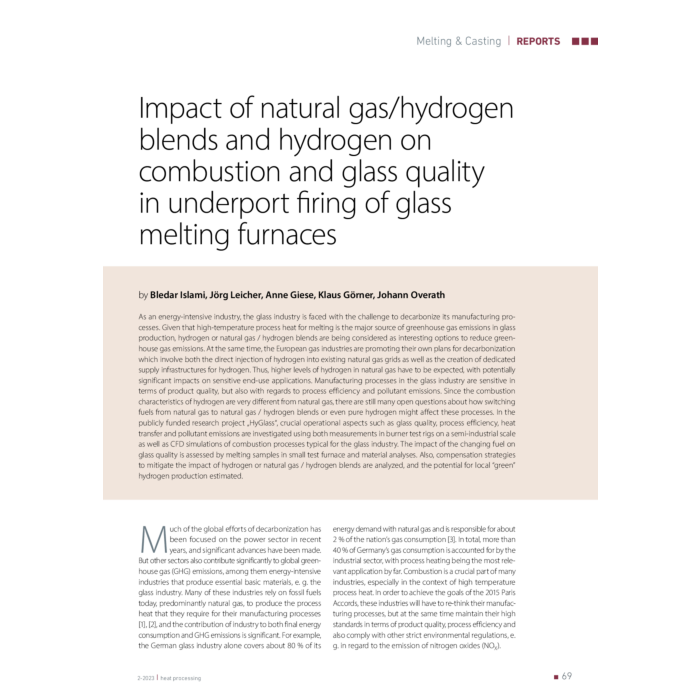Impact of natural gas/hydrogen blends and hydrogen on combustion and glass quality in underport firing of glass melting furnaces
4,90 €
Auf Lager
Artikelnummer
00541_2023_02_05
As an energy-intensive industry, the glass industry is faced with the challenge to decarbonize its manufacturing processes. Given that high-temperature process heat for melting is the major source of greenhouse gas emissions in glass production, hydrogen or natural gas / hydrogen blends are being considered as interesting options to reduce greenhouse gas emissions. At the same time, the European gas industries are promoting their own plans for decarbonization which involve both the direct injection of hydrogen into existing natural gas grids as well as the creation of dedicated supply infrastructures for hydrogen. Thus, higher levels of hydrogen in natural gas have to be expected, with potentially significant impacts on sensitive end-use applications. Manufacturing processes in the glass industry are sensitive in terms of product quality, but also with regards to process efficiency and pollutant emissions. Since the combustion characteristics of hydrogen are very different from natural gas, there are still many open questions about how switching fuels from natural gas to natural gas / hydrogen blends or even pure hydrogen might affect these processes. In the publicly funded research project „HyGlass“, crucial operational aspects such as glass quality, process efficiency, heat transfer and pollutant emissions are investigated using both measurements in burner test rigs on a semi-industrial scale as well as CFD simulations of combustion processes typical for the glass industry. The impact of the changing fuel on glass quality is assessed by melting samples in small test furnace and material analyses. Also, compensation strategies to mitigate the impact of hydrogen or natural gas / hydrogen blends are analyzed, and the potential for local “green” hydrogen production estimated.
| Autoren | Bledar Islami, Jörg Leicher, Anne Giese, Klaus Görner, Johann Overath |
|---|---|
| Erscheinungsdatum | 01.05.2023 |
| Format | |
| Verlag | Vulkan-Verlag GmbH |
| Sprache | Deutsch |
| Titel | Impact of natural gas/hydrogen blends and hydrogen on combustion and glass quality in underport firing of glass melting furnaces |
| Beschreibung | As an energy-intensive industry, the glass industry is faced with the challenge to decarbonize its manufacturing processes. Given that high-temperature process heat for melting is the major source of greenhouse gas emissions in glass production, hydrogen or natural gas / hydrogen blends are being considered as interesting options to reduce greenhouse gas emissions. At the same time, the European gas industries are promoting their own plans for decarbonization which involve both the direct injection of hydrogen into existing natural gas grids as well as the creation of dedicated supply infrastructures for hydrogen. Thus, higher levels of hydrogen in natural gas have to be expected, with potentially significant impacts on sensitive end-use applications. Manufacturing processes in the glass industry are sensitive in terms of product quality, but also with regards to process efficiency and pollutant emissions. Since the combustion characteristics of hydrogen are very different from natural gas, there are still many open questions about how switching fuels from natural gas to natural gas / hydrogen blends or even pure hydrogen might affect these processes. In the publicly funded research project „HyGlass“, crucial operational aspects such as glass quality, process efficiency, heat transfer and pollutant emissions are investigated using both measurements in burner test rigs on a semi-industrial scale as well as CFD simulations of combustion processes typical for the glass industry. The impact of the changing fuel on glass quality is assessed by melting samples in small test furnace and material analyses. Also, compensation strategies to mitigate the impact of hydrogen or natural gas / hydrogen blends are analyzed, and the potential for local “green” hydrogen production estimated. |
Eigene Bewertung schreiben


